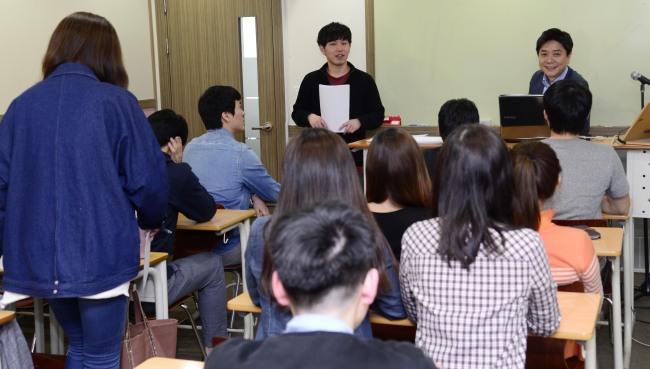http://www.koreaherald.com/view.php?ud=20140423000941
Each year, hundreds of students knock on the doors of graduate schools of interpretation and translation. With the prolonged economic slump and jobless rate virtually at a standstill, many students are seeking to acquire skills that will prevail regardless of the economic situation.
“It is very difficult for our generation to get a job, and I thought becoming a professional (interpreter) would give me the upper hand in the labor market,” said a 22-year-old surnamed Shin.
She said the benefits of becoming a freelance interpreter included control over her own work hours.
Like Shin, many students and former office workers spend months and even years trying to enter graduate schools of interpretation and translation at Hankuk University of Foreign Studies and Ewha Womans University, the top schools in the field.
 |
| Students preparing for graduate schools in interpretation and translation practice at CY English, a language institute in Seoul, Monday. (Park Hae-mook/The Korea Herald) |
While some interpreters complain of a shortage of work due to the “excessive” number of newcomers, many language majors consider the job a surefire way to maximize one’s expertise.
Choi Ju-eun, a 23-year-old English major, said the most valuable part of being an interpreter is that you get to keep studying English.
“Translation is a job where you have to constantly be ‘awake.’ You have to retain your general knowledge of social issues and you need to have a will to learn new things every time you take on a project,” said 30-year-old Won Jee-hee.
According to Won, a former researcher for local think tank the Institute of Convention and Exhibition Management, most desk jobs force employees to do the same thing over and over again. Repeatedly doing identical tasks prevents workers from polishing their skills.
While translation is an attractive job to many, applying one’s language skills to deliver someone’s ideas to another person remains a tall order.
“One thing I always noticed was, when I spoke to a native speaker, he or she always seemed to react differently to my expectations. This was because I would just put together vague ideas and say it in English,” said former law major Lee Seong-il, who is studying to become a professional interpreter.
Lee Chang-yong, who runs a language institute in Gangnam, southern Seoul, said the key to translation is to grasp a clear idea of what one has to translate.
“The essence of interpretation is the interpreter; he or she has to comprehend the content, change it into the target language and put it in words that are logical and make sense,” he said.
Lee’s CY English operates preparatory courses for entrance exams for HUFS and Ewha University interpretation and translation schools, which he said prepare students to become “communication experts.” The initial courses focus on training students to actually use the language skills acquired through years of studying.
Many experts in Korea point to the lack of speaking and writing lessons in English education. This is mainly because the English tests in the college entrance exam consist of listening, reading and grammar sections, but not speaking or writing.
Lee said students are trained to accept English knowledge rather than to use it.
“The shift to output-based thinking is the first step toward training to become an interpreter,” he said.
According to Lee, the key to interpretation is organizing ideas well.
“No matter how many words you have memorized, or how much text you’ve read, if means nothing if you cannot use it.”
By Yoon Min-sik (minsikyoon@heraldcorp.com)
As my dream is to be an interpreter, called communication experts, this article completely caught my eyes.I'm planning to enter graduate school of monterey in USA, studying for professional ability of translation. In Korea, there is no official license to enter the interpretation market. But getting a degree from a graduate school is regarded as a necessary step to start an interpretation career and build a network of interpreters and clients.
Recently, there are so many people speaking English and other foreign language that many people easily say that you can become an interpreter if you speak a foreign language. However, it is not true.
Interpreters are a person who have mastered a foreign language as well as have cultural understanding, analytical acumen, technical knowledge and even social skills. So, it goes for beyond the linguistic aspect.
To be communication expert is very difficult. At first time, I didn’t even know where to start studying so that was to be a big pressure on me. Looking back on it now, I was rushing to do it...
I’d like to make study group. if you guys are interested in communication skill or someone who has same goal like me, please contact me and let me know you!
kakao ID; joyeanji
In Article
-Retain your general knowledge of social issues and learn new things every time you take on a project.
-the key to translation is to grasp a clear idea of what one has to translate.
- Comprehend the content, change it into the target language and put it in words that are logical and make sense.
-Under the difficult economic condition, most young students prefer stable and high-salaried jobs, than venturing into their into own businesses.
Vocabulary
-economic slump
-jobless rate
-at a standstill
-upper hand
-surefire way
댓글 없음:
댓글 쓰기